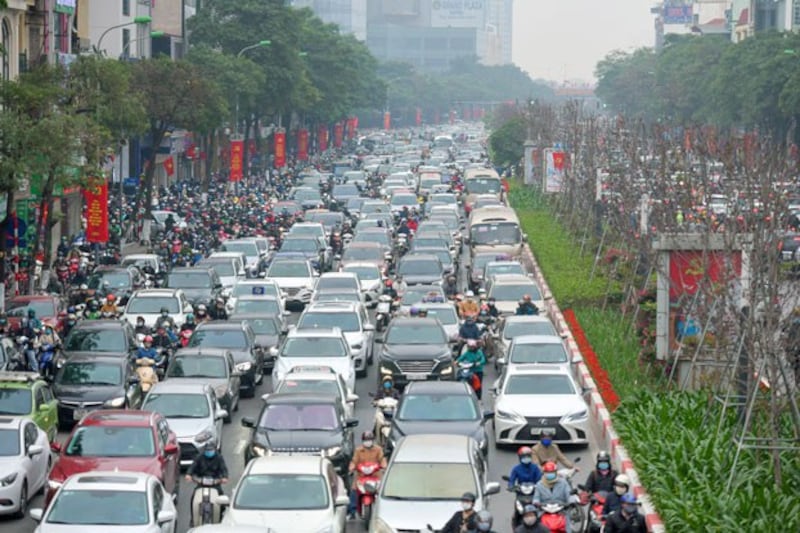Vietnamese drivers entering big cities during peak traffic periods will have to pay “congestion fees” if one lawmaker gets his way.
Nguyen Phuong Thuy, a representative from the capital Hanoi, argued during a discussion Tuesday in the National Assembly that the fee would boost the state budget, increase funds for land transport infrastructure – and reduce traffic jams.
He was one of 23 National Assembly deputies who discussed a draft Law on Roads, including the possibility of charging fees on personal cars that enter city centers at certain times, according to a state media.
The proposal comes as Vietnam grapples with growing traffic congestion, inadequate transportation infrastructure and increasing air pollution from exhaust fumes despite the government's commitment to net-zero emissions by 2050.
Officials in Ho Chi Minh City, Vietnam’s largest city with a population of 9 million, calculated that in 2022, the city lost about 138 trillion dong, or US$5.4 billion, due to traffic jams for missed work time, wasted fuel while sitting in traffic and labor force costs.
Public transportation is lacking. In 2022, Hanoi had about 5.8 million motorbikes and 600,000 automobiles, though only 140 bus lines, meeting an estimated 31% of total demand, according to a report by the Hanoi Times.
Five centrally governed cities in Vietnam – Hanoi, Ho Chi Minh City, Haiphong, Danang and Can Tho – have the authority to impose driving charges not previously defined by law, according to a report by Viet Nam News.
It wasn’t immediately clear what the fees might be under the new proposal.
Three conditions must be met for the scheme to work, Thuy said, according to an online report by VN Express.
First, the collection should be digitized. Second, public transportation should meet at least 30% of transportation demand. And third, infrastructure, parking lots, and public transit systems must connect personal vehicles with public ones.
“Cars owned by people both inside and outside the city have increased, while old, dilapidated infrastructure has failed to meet transport demand,” he said.
Mixed views
But some people are skeptical the plan would be effective.
Hanoi resident Nguyen Khac Toan said he didn’t believe a fee on inbound-city cars would reduce traffic jams.
“The fee collection measure seems right, but it is only situational and patchy,” he told Radio Free Asia. “It would not help because those who need to drive a car into the city would pay to do so.”

Former National Assembly Deputy Luu Binh Nhuong wrote on Facebook that poor traffic management is the main cause of traffic jams in Hanoi — not inbound personal vehicles.
Therefore, any fees imposed on these drivers would not be not fair and would be a violation of free movement and free business under the country’s Constitution and Competition Law, he said.
Nguyen Quang A, another Hanoi resident, said a willingness by city officials to address limited parking spaces and high parking fees would help ease the situation. Drivers have to pay several hundred thousand dong an hour to park, and lots are difficult to find, he said.
“For city dwellers, there should be parking lots built for them, but in case they park on the streets, a fee should be collected for using public space,” he said. “Those who own cars have to follow. That is the easiest way to solve traffic jams and to collect money for the city budget.”
Past proposals
This isn’t the first time that Vietnam’s major cities have considered feeson personal vehiclesentering the citycenter – but none have been implemented.
The Vietnamese government issued a decree in April 2022 to enhance order, transport security and reduce traffic jams, and several cities were told to conduct a fee collection pilot program for inbound vehicles.
In 2017, Hanoi’s People’s Council issued a resolution on enhancing traffic order and combating traffic congestion. It called for limiting or stopping motorbike traffic in certain areas of the five centrally governed cities after 2030, as well as collecting tolls from vehicles in highly congested and polluted areas of major cities.
The People’s Committee of Ho Chi Minh City, Vietnam’s southern economic hub, included a traffic jam fee in its general city planning project until 2040, a plan that would look further to 2060. Fees would be collected during specific times of the day, including peak travel.
Translated by Gia Minh for RFA Vietnamese. Edited by Roseanne Gerin and Malcolm Foster.
